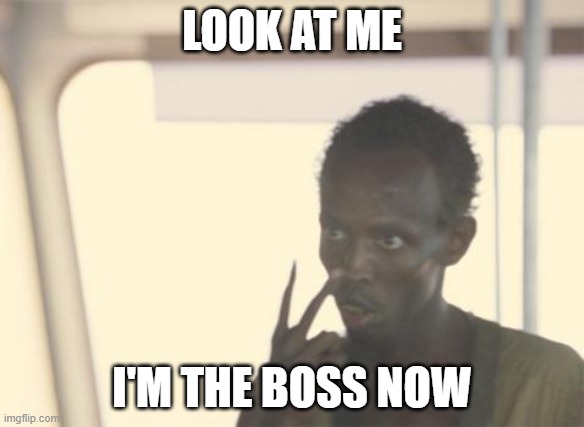 |
| Image from Pixabay |
I was gonna write about how I prepare for my tabletop games, because, as you may know, I'm a #ForeverGM. But as I started going through my process, I wondered why I do things one way and not another. Like basically every other GM, how I prepare my game is influenced by what I want in a game, as a GM I mean, which I may discuss later, I dunno.
But when you start considering what one wants in a game, it leads straight to the ever-discussed "types of GM" topic. There are great articles out there about that already, though! I'm pretty partial to RPG.net's "Character Class #3: Types of Game Masters" and GeekOutUK's "DMing 101 -- Types of DM."
So what more can I bring to this conversation?
Probably not much.
Earlier on, I wrote this article about skills learnt from tabletop that could be brought into the workforce. That got me thinking ... in essence, a Game Master is a little bit like a team manager (or leader, depending on the relationship you have with your players). Your GMing style can say a lot about the kind of manager you'd be. Well that is, if you don't have a total disconnect between your hobbies and your worklife, but it's actually not my case.
Before anyone starts throwing tomatoes at me: I know that there are many categorization of management styles. And I also know that there's a world of difference between a manager and a leader but it's not a super important distinction for the point I'm trying to make.
I based myself off "6 Different Management Styles (and How to Use Them)" by Daphne Blake on Hubworks.
Also, this is just for fun so there's definitely nuances I'm gonna miss but that doesn't mean I can't hit some notes right.
All good? All good! Let's go!
Coercive
The name, just like this style, is pretty straightforward. It's got that "do what I ask you because I ask you" vibe. Let's be honest, it's definitely not a pretty look. I mean, no one really likes to be told what to do, when to do it, how to do it ... It's terrible for morale!
How does the "Coercive" management style translate into GMing?
- Most likely to say "It's my way or the highway!"
- Heavy amount of scripting and railroading
- Little to no concern for what makes players and characters unique
- Little to no character development
- Feels more like being an NPC in someone's story
- The plot and hooks can be totally absent here: the goal is not the story or player achievement, it's actually game master's enjoyment
- Players may not care much about the game, or the GM

Authoritative
While the "Authoritative" may sound like it's the same thing as "Coercive," there's a bit of a distinction here. Where a coercive manager (or GM) will want you to do things the way they want because that is what they want, an authoritative manager usually has a goal or a vision in mind.
They can also picture clear and direct ways to reach this goal. And they will guide you on that path. And by "guide," I really mean "instruct."
It's not all bad if you like being bossed around, or at the very least, guided through a complete, railroady-story or event.
How does the "Authoritative" management style translate into GMing?
- They have a story they want to tell you, create a character for it
- Limiting races, classes, access to magic or feats, to fit their campaign or setting
- Will usually have a very good grasp of the setting and may info dump on players, expecting them to be able to sort it out
- Usually works better with less experienced players or players who just want to be told a good story
- There's a certain leniency on how to achieve things, but things need to move toward the goal, not away, and they also shouldn't stall
- Most likely to say "No, you can't do that" but at least they'll usually give you a reason!
- May use GMNPCs in the shittiest fashion
While not my favourite type of GMing, if there's a trust and confidence relationship built between the GM and the players, the "authoritative" way can be fulfilling. Sometimes, there's something soothing in kicking back and seeing the GM's world, mind, and story unfold. The players have to be able to trust, though, that this vision and story is for the player's benefit, not the GM's.
Pacesetting
It may sound like pacesetters don't apply to TTRPGs, because let's be honest, you're not trying to deliver a product and you're not on a tight schedule ...
The "Pacesetting" type of management falls closer to the "Coercive" type, unless the team can think of a better way to do things. The pacesetter has goals and objectives in mind, but also how to reach them and how fast (or slow) they should be reached.
How does the "Pacesetting" management style translate into GMing?
- Is not very likely to "wing it" and may overprepare (then get upset if they have to trash their preparation)
- Is most likely, to quote Farador, say "We're playing, it's serious."
- Has very high expectations of players on how fast/well they will tackle their challenges
- Likely to reward goal completion
- May accept creative solutions that make the story and game run more smoothly
- Will decide when breaks are taken (if any) and keep players focused on the game
- More likely to ban distractions at the table
- Probably can't play or GM as much as they want and they try to make the most out of the time they have
To me, this feels impersonal, and can while work great when you're in a crisis or in a hurry or you just know more than, say, your employees. But is it really fair to assume that the GM knows better than his players?
Sure, the GM may be more knowledgeable about some stuff, but it's the player's whole thing to know about their characters!
Democratic
So far we've seen manager types who are hoping employees act a certain way. But some managers want their team to feel involved. Of course, there's always an end goal, something to strive for. Instead of telling their employees how to accomplish this goal or vision, the democratic manager will ask their team members to take part in the decision-making process.
How does the "Democratic" management style translate into GMing?
- Asks the players what they want to do
- May present more than one options or wait for the players to explain what they want to do
- Expects players to respect one another and try to reach a consensus
- May try to avoid alignments that are diametrically opposed at the table
- Will usually not weigh in too much in the decisions and act as an arbiter
- May foster a sense of ownership at the table, good or bad
- Asks for the players' opinions on situations, either as a group or individuals
- May answer a question with another question. Oh, you think the king may hide the scroll you're looking for in a secret room in the library. Can I look for it? Well, Draknar, I don't know, is that what you want to do? How do you plan on pulling this off?
- Tries to get the action moving with questions like "What do you want to do?" and "Are you ready?"
I'm not gonna lie, I think (or hope) most tables are run this way. When a problem comes up, the whole party (sometimes including the GM) will get together and agree on how to solve it.
That's a great way to make players feel like they can, y'know, weigh in and huh, have a say in their fucking hobby! It's not much to ask!
Ownership is a super important part of tabletop RPGs for some players: they want to feel like they have a say in how the story grows.
Coaching
At first I thought, the "Coaching" style doesn't really apply to tabletop RPGs, does it? A coaching manager really gets into it with their team members, using their wealth of experience and knowledge to uplift them and teach them better practices or new approaches. This requires a lot of time, trust, and energy.
Not every manager can pull this off. I'm sure you've had experiences where your boss told you "You should do x like this?" and you were just like "Wtf yo when was the last time you even had to do this?" I'm not saying it happened to me, but it may have ...
ANYWAYS, not the point!
Point is ... isn't that what a good GM does with new (or less experienced) players? I know I do. If a player asks me a question, sure I may be in a rush and just answer, but sometimes, I don't know, I take the time to answer the question and explain the hows and whys of the answer?
I can't be the only one, right?
How does the "Coaching" management style translate into GMing?
- Suggests solutions to players' problems when they are stumped
- Helps them find answers
- Explains the game, its mechanics, inside and out, when asked or needed
- Has an in-depth knowledge of the game system or lore (or both!)
- Is willing to discuss complex questions or scenarios (often out of game as to not break the flow)
- Usually good with new players who show curiosity
- May or may not be looking for a player to replace them as #FoeverGM
- Often thinks that the "fun" is a shared responsibility between the GM and the players
Pretty sure it can annoy the fuck out of some players who (sometimes rightfully) think they know more than their game masters, but generally speaking, this kind of coaching all about becoming better at what we do.
Affiliative
This type of management goes far beyond simply creating a good, streamlined process to achieve a goal: it aims at creating a stronger team, and making employees feel like they're part of a family or something bigger. Sometimes, managers who use this approach may fade into the background or become just "another member of the team."
Meaningful relationship between coworkers and people are put front and center in with this management style, sometimes at the cost of productivity.
How does the "Affiliative" management style translate into GMing?
- Asks about your weekend plans or how your family is doing with genuine interest
- May not care that time gets wasted in game or that a player is using their phone because what matters is the time spent together
- Most likely to drink alcohol while GMing because this is another evening hanging out with friends
- May try to make plans with players outside of the game
- Asks players how they are doing often
- Will stop a game if someone appears uncomfortable
- Usually pretty good at "reading the table"






Comments
Post a Comment